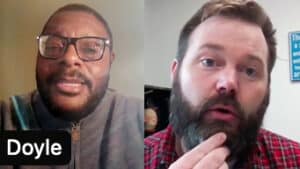Doyle, Davis-Williams Meet with UCC Rural and Small Town Churches in Ministry

The UCC Council for Health and Human Service Ministries was honored to deliver a presentation at the February Zoom meeting of the Coalition of UCC Rural and Small Town Churches in Ministry. Jamar Doyle, president and CEO of CHHSM, and George Davis-Williams, RN, a member of CHHSM’s Emerging Leadership Cohort and seminarian at United Theological Seminary of the Twin Cities in St. Paul, Minn., represented CHHSM at the meeting.
Doyle and Davis-Williams were asked to examine how CHHSM engages in rural and small town settings and give examples of current existing partnerships. CHHSM was invited to the meeting by the Rev. Roberto Ochoa, the UCC’s minister for ethnic inclusion and congregational support for rural and small churches.

Following a brief introduction, Doyle gave an overview of CHHSM, the largest component of healing ministries in the UCC. He explained that CHHSM members annually provide around $1 billion in uncompensated care. CHHSM members collaborate through CHHSM’s leadership programs, its group purchasing agent and vast networking and support services via all of its programs, including Affinity Groups, the Nollau Leadership Institute, and the Annual Gathering.
But most importantly, said Doyle, are the ways in which CHHSM agencies impact their own local communities. He cited Orion Family Services in Madison, Wis., and St. John’s UCC in Monroe, Wis., as one example.
For more than 20 years, Orion and St. John’s have been ministry partners. Orion wanted to renovate its old girls group home in order to meet the needs of rural Green County. With the help of St. John’s UCC and other community partners, the new clinic opened in 2018. Shortly after opening, Orion secured certification to open a new outpatient mental health clinic in rural Green County. Monroe House now serves that rural community, thanks to the Orion-St. John’s partnership.
Doyle also described the partnership between South Haven UCC in Bedford, Ohio, and United Church Homes (UCH). As far back as 1968, the church wanted to turn its back acreage into affordable older adult housing. It took 20 years, but in 1989, thanks to a partnership between South Haven and UCH, South Haven Woods opened. In 2020, the church and UCH celebrated the renovation of South Haven Woods that added new one-bedroom units.
Today, South Haven Woods provides apartments for persons aged 62 years or older, as well as for persons who are physically handicapped or mobility impaired. The community reaches out to people in the local community whose income does not exceed 30 percent of the area median income. Residents pay only 30 percent of their adjusted monthly income for rent, and all utilities except telephone and cable television, are included.
Following Doyle’s presentation, Davis-Williams spoke from the perspective of a registered nurse supervisor working in a Michigan school system that includes many rural areas. In a talk titled “Relevance of Ministry and Partnerships for Rural Settings,” Davis-Williams discussed the tension between the challenges of human power, budgets, and competition for resources and the desire to take advantage of services through partnerships with public agencies, nonprofit organizations, and more.
He cited the main rural health concerns: chronic disease, drug use, access to mental and physical health care, and access to transportation. Today, he said to many nods of agreement from the listeners, drug overdose is higher in rural areas than in urban areas.
One solution, Davis-Williams said, is stepping into partnerships of relevancy. For example, making connections with schools to partner with mindfulness programs, school wellness committees, and hygiene programs — for students who, for example, don’t have access to items like deodorant or toothpaste.
He also reviewed community partnership opportunities — with local CHHSM agencies or other health and human service agencies — that can be housed in unused rooms at local churches: mental health and telehealth programs; parish nursing; harm reduction programs, Narcan programs, peer counseling and case workers, CPR/AED/First Aid, transportation ministries, and laundry ministries, among others.
Davis-Williams discussed programs implemented in his community, including a mindfulness program that began in the schools and is expanding to the local community. He also cited an example of how advocacy helped. Due to high insurance deductibles, clients were refusing treatment because of the cost, so many programs were dropping virtual counseling. After advocating with state officials, Davis-Williams continued a program of having therapists in schools. His office bills insurance and waives the expensive co-pay, thus making it affordable for the students’ families.
A Q&A session followed the presentation by Doyle and Davis-Williams, where participants and presenters discussed a variety of topics, including the UCC’s WISE program (Welcoming, Inclusive, Supportive, and Engaged in the Mental Health of the community and the wider world) and non-trauma-based mental health first aid programs.
At the end of the meeting, Ochoa summed things up nicely by referring to Small Town and Rural Coalitions, abbreviated to “STAR.” “We are a star coalition,” he said. “We are a star church,” thriving and active in our own settings.
Join Our Mailing LIst
Follow on Facebook
Cedar Community and Town of West Bend Partner to Add Full-Time Law Enforcement Officer - CHHSM
www.chhsm.org
Cedar Community President and CEO Nicole Pretre announced last week a partnership agreement with the Town of West Bend, Wis. Town of West Bend Supervisor and Board Chair, Troy Zagel, and Pretre have b...